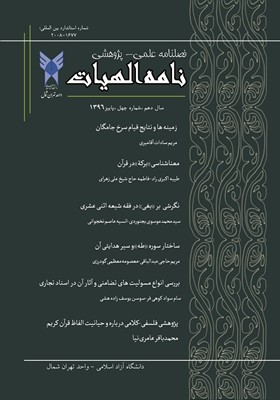فلسفه مجازات دراسلام؛ ترکیبی از گذشته گرا وآینده نگر
محورهای موضوعی : نامه الهیات
فاطمه جباری
1
*
,
احمد باقری
2
![]() ,
یونس واحد یاریجان
3
,
یونس واحد یاریجان
3
1 - دانشجوی دکترای فقه ومبانی حقوق اسلامی در دانشگاه آزاد اسلامی واحد تهران شمال
2 - استاد دانشگاه تهران
3 - استادیار دانشگاه آزاد اسلامی واحد تهران شمال
کلید واژه: اسلام, فلسفه مجازات, گذشته گرا, آینده نگر, ترکیبی دوگانه,
چکیده مقاله :
یک نظام کیفری به صورت طبیعی و با در نظر گرفتن اهداف و فلسفه آن قابل بحث وبررسی است. در سیاست کیفری اسلام مجموعه متنوعی از مجازاتها یافت می شود که شامل قصاص،حدود،تعزیرات ودیات است وهریک با منطقی خاص تشریع گردیده اند. به عنوان مثال، قصاص را می توان کیفر بزه دیده محور دانست وتعزیرات را مسیری برای اجرای اصل فردی کردن مجازاتها ونیز انطباق با مقتضیات زمان ومکان دانست، درمقابل حدود را می توان مجازاتهایی جرم محور تلقی نمودکه در پی حراست از بنیادهای اخلاقی ودینی جامعه است ودیات را می توان ترمیم خسارت وارده بر مجنی علیه دانست. تئوریهای گوناگونی تاکنون در باره فلسفه مجازات ارائه شده است ازجمله، دیدگاههای گذشته گرا وآینده نگر که در رویکرد اول، مجازات به دلیل تأمین هدف آتی ونتایج سودمند آن توجیه شده است ونظریه تلافی جویانه است در حالی که، در رویکرد دوم به خطایی که مجرم مرتکب می شود نظرداردونظربه تقلیل جرایم ،باز پروری واصلاح است، ولی دیدگاه اسلام در مورد توجیه عقلانی واخلاقی مجازات یک دیدگاه تر کیبی است واین دیدگاه بر کل نظام کیفری اسلام حاکم است وهمه مجازاتهااعم از حدود وقصاص وتعزیرات براساس این تئوری قابل توجیه هستند. این تئوری به عدالت واستحقاق از یک طرف ورسیدن به آثار ونتایج مطلوب فردی واجتماعی از طرف دیگر در سطح بسیار عمیق وواقع بینانه مورد توجه قرار گرفته است. در این مقاله می کوشیم تا با تحلیل وتفسیر فلسفه وهدف کیفر در اسلام دیدگاههای گذشته گرا وآینده نگر را تبیین نموده وآثار و ویژگی های هر یک را بیان کنیم و با استدلال وذکر نمونه هایی از حدود، قصاص، تعزیرات و حتی دیات اثبات کنیم که اسلام تر کیبی از این دو دیدگاه است و دارای ویژگی های خاص خود می باشد.
A penal system can be discussed and examined naturally, considering its goals and philosophy. In the penal policy of Islam, there is a variety of punishments, which include retribution, limits, punishments and vows, and each of them has been legislated with a specific logic. For example, retribution can be considered as a punishment based on the victim and punishments can be considered as a way to implement the principle of individualization of punishments and compliance with the requirements of time and place. In contrast, punishments can be considered as crime based on protecting the moral and religious foundations of society. Can be considered as repairing the damage done to the victim. Various theories have been proposed so far about the philosophy of punishment, including retrospective and futuristic views, in which the first approach justifies punishment for achieving its future purpose and beneficial results, and the second approach to the error committed by the offender. It can be considered as a reduction of crimes, rehabilitation and correction, but the Islamic view on rational and moral justification of punishment is a more basic view and this view governs the entire Islamic penal system and all punishments, including limits, retribution and punishments can be justified according to this theory. This theory of justice and entitlement on the one hand to achieve the desired individual and social effects and results on the other hand has been considered at a very deep and realistic level. In this article, we try to explain the retrospective and futuristic views by analyzing and interpreting the philosophy and purpose of punishment in Islam, and express the effects and characteristics of each, and prove by argument and mentioning examples of limits, retribution, punishments and even diyat that Islam Tor Kibi is from these two perspectives and has its own characteristics.punishmentˈpəniSHməntTranslations of punishmentNounFrequencyمجازاتpunishment, penalty, retribution, reprimandتنبیهpunishment, chastisement, talking to, gruellingسزاreward, punishment, retribution, remuneration, requitalتادیبdiscipline, correction, punishment, crackdownگوشمالیrebuke, punishment, scourgeاجرreward, wage, remuneration, award, defrayal, punishmentDefinitions of punishmentNoun1the infliction or imposition of a penalty as retribution for an offense.crime demands just punishmentSynonyms:chastisingchastisementpenalizingpunishingdiscipliningretributiondamnationExamples of punishmentyour machine can take a fair amount of punishment before falling to pieces5 more examplesSynonyms of punishmentNounchastisingpenalizingcomeuppancechastisementpenaltybatteringmaltreatment44 more synonyms
_||_

